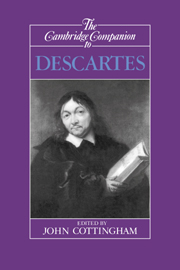Book contents
- Frontmatter
- Introduction
- 1 Descartes' life and the development of his philosophy
- 2 Descartes and scholasticism
- 3 The nature of abstract reasoning
- 4 Cartesian metaphysics and the role of the simple natures
- 5 The Cogito and its importance
- 6 The idea of God and the proofs of his existence
- 7 The Cartesian circle
- 8 Cartesian dualism
- 9 Descartes' philosophy of science and the scientific revolution
- 10 Descartes' physics
- 11 Descartes' physiology and its relation to his psychology
- 12 Descartes on thinking with the body
- 13 The reception of Descartes' philosophy
- Bibliography
- Index
1 - Descartes' life and the development of his philosophy
Published online by Cambridge University Press: 28 May 2006
- Frontmatter
- Introduction
- 1 Descartes' life and the development of his philosophy
- 2 Descartes and scholasticism
- 3 The nature of abstract reasoning
- 4 Cartesian metaphysics and the role of the simple natures
- 5 The Cogito and its importance
- 6 The idea of God and the proofs of his existence
- 7 The Cartesian circle
- 8 Cartesian dualism
- 9 Descartes' philosophy of science and the scientific revolution
- 10 Descartes' physics
- 11 Descartes' physiology and its relation to his psychology
- 12 Descartes on thinking with the body
- 13 The reception of Descartes' philosophy
- Bibliography
- Index
Summary
“I resolved one day to . . . use all the powers of my mind in choosing the paths I should follow” (Discourse Part I: AT VI 10: CSM I 116). Thus Descartes introduces his account of his celebrated first solitary retreat during the winter of 1619-20. But he goes on to note that he decided to postpone actually embarking on his life's work until he had reached “a more mature age than twenty-three, as [he] then was ” (Part II: AT VI 22: CSM 1122). Toward the end of the winter of 1619-20, then, he began to travel, and this occupied “the next nine years”; only after these “nine years ” did he finally work out his philosophy, which was to be “more certain than the commonly accepted one” (Part III: AT VI 28, 30: CSM I 125-6). This period of Descartes' early life is obscured by the errors of his chief biographers, which have been repeated down the centuries. There is a marked tendency to bring forward his interest in science and the search for its foundations - an interest which in fact developed gradually and relatively late.
- Type
- Chapter
- Information
- The Cambridge Companion to Descartes , pp. 21 - 57Publisher: Cambridge University PressPrint publication year: 1992
- 7
- Cited by

